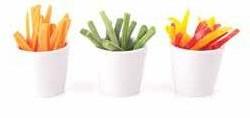
4 minute read
Nutrition for Pregnancy
BY JEN CASEY, cnp, nncp
Food is life, especially when your body is working overtime growing a new one! When you are expecting, good nutrition is more important than ever. Baby’s growth and development depends on what mom is eating, as nutrients are passed on to her baby, and stored for later.
You don’t have to eat double the amount you usually eat. Instead, focus on quality ingredients in your meals and make sure the few extra hundred calories required are supporting the baby's growth, and your changing body, both during pregnancy and postpartum, AKA “the forgotten trimester”.
Pregnancy is not the time to restrict foods or experiment with new diets. Instead, nourish to flourish. Make every bite count, knowing that each meal is going toward growing a new life, and supporting you on your pregnancy journey.
1st Trimester
Approximately 50% of expectant mothers suffer from morning sickness during the first three months of pregnancy. As an Holistic Nutritionist and mother of two, I can relate, but still always encourage eating during this important time, even if you do not feel the urge. Smaller, frequent meals tend to be easier to tolerate than three larger ones, while ginger, applesauce, oatmeal, lemon, and peppermint are great digestible remedies for nausea. Your prenatal vitamin should contain B6, also helpful with nausea, but you can also top up with foods like leafy greens, bananas, chickpeas, and avocado.
JEN CASEY is a Registered Holistic Nutritionist and Certified Health Coach through Next Bite Nutrition Coaching. She’s also an Academic Advisor at The Institute of Holistic Nutrition. Book a free, 30-minute online nutrition appointment with Jen or one of our other nutritionists at naturesfare.com
By now, your morning sickness has likely subsided and you might start having food cravings, food aversions, and constipation, all thanks to hormone changes. This is an important time for baby’s bone growth, which primarily comes from mom’s mineral stores. Include foods such as fatty fish, plain yogurt, almonds, sesame seeds, whole grains, cruciferous veggies, and leafy greens for extra dietary calcium sources. Baby’s blood volume increases now, so keep up with your iron-rich foods, like organic, lean meats, spinach, eggs, black beans, and chickpeas. Many women start to feel the constipating effects of the extra iron from their prenatal vitamin, so include plenty of water and dietary fibre from fresh fruit, vegetables, and whole grains to keep things moving.
The second trimester is when insulin resistance can develop, leading to gestational diabetes. To help keep blood sugar stable, eat three meals and snacks balanced with healthy fats, fibre, and protein. Limit your starches, refined foods, sweets, and foods high on the glycemic index.

Healthy snack ideas:
• Hummus and veggie sticks
• Apple with almond butter
• Handful of trail mix with a few dark cacao nibs
• Bliss balls
• Avocado whole grain toast
• Smoothies with plain yogurt, berries, almond milk, hemp heart seeds, and spinach
Balanced meal ideas:


• Organic chicken breast with mushroom gravy, quinoa, and two roasted veggies
• Wild salmon with lemony tabouli or
Greek salad
• Veggie omelette with whole grain toast
3rd Trimester
Your appetite is probably strongest now, while baby is growing rapidly and you are trying to keep up with your own body’s changes. It might feel like you are running out of room, as baby puts pressure on your bladder and stomach. Meals might have to become smaller and more frequent again at this stage, to prevent heartburn, but still aim to include around 450 extra, quality calories per day. If heartburn is a problem, avoid spicy or fried foods, and sip on ginger tea after meals to help with digestion.
This is an important trimester for brain development, as DHA is now stored in baby’s brain for life outside of the womb. Include foods to support this stage, like chia seeds, fatty fish, hemp heart seeds, flax, walnuts, avocado, and fish oil. This is also the time to keep up with dietary iron, since baby starts to store it for their own use for up to three months postpartum.

Meal ideas to support iron stores and brain development:
• Spinach salad with avocado, olive oil, slivered almonds, chicken breast or salmon, and strawberries
• Egg salad on dark rye, with small salad or soup • Chili with mixed beans, ground turkey or tofu, and lots of veggies, topped with guacamole and shredded cheese
• Flax pancakes with pumpkin seeds and fresh berries
• Black bean burger with avocado and tomato
4th Trimester
Yes, there is a fourth trimester, and it is often forgotten. Once baby is born, the focus is all on them, with not much left for the new mother. Regardless of the birth experience, mom’s body needs to heal and hormones need to adjust. If you choose to breastfeed, you will need to eat even more calories and drink more water than you did when pregnant. Continuing with balanced meals and including plenty of protein will support the healing process. The best thing you can do for yourself, or get some help with, is to prepare as many freezer meals as possible for those first few weeks postpartum. This is a time to focus on less cooking, more self care, sleep, and bonding with your baby as you get to know each other and you transition into motherhood.

Helpful postpartum meal ideas:
• Vegetable and ground turkey lasagna
• Mixed bean chili
• Breakfast cookies
• Scrambled egg cups
• Chia seed pudding with almond butter and strawberries
Welcome to this wonderful journey that is motherhood. Just be sure to nourish yourself along the way.










